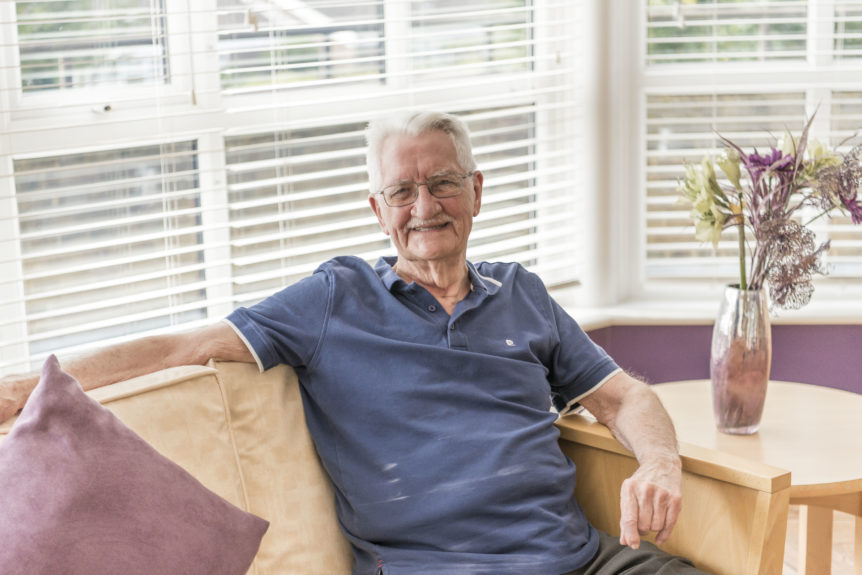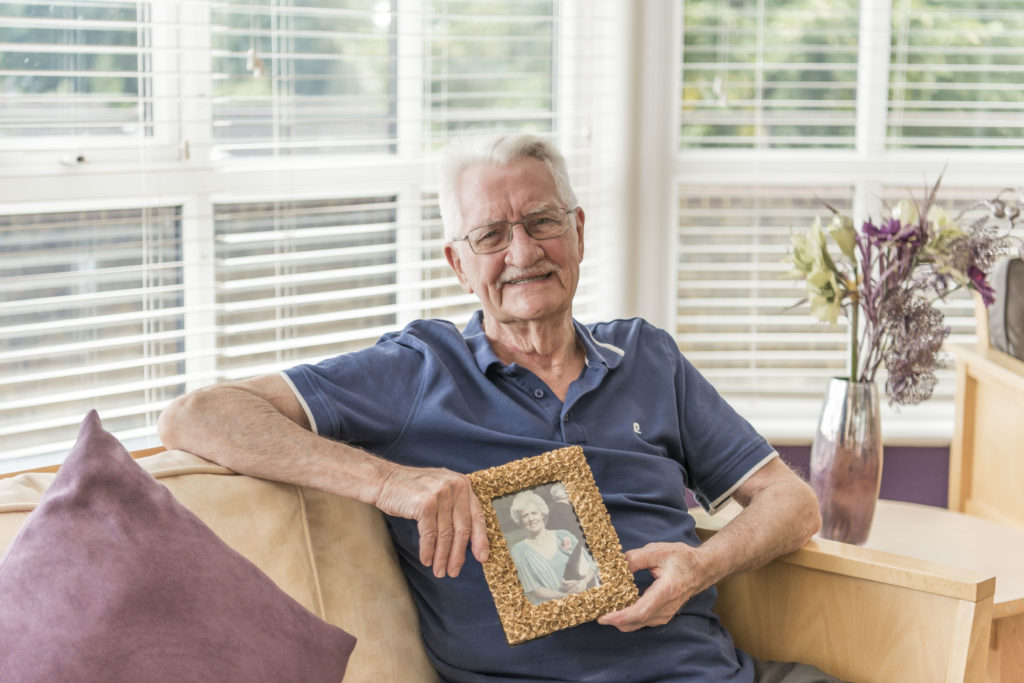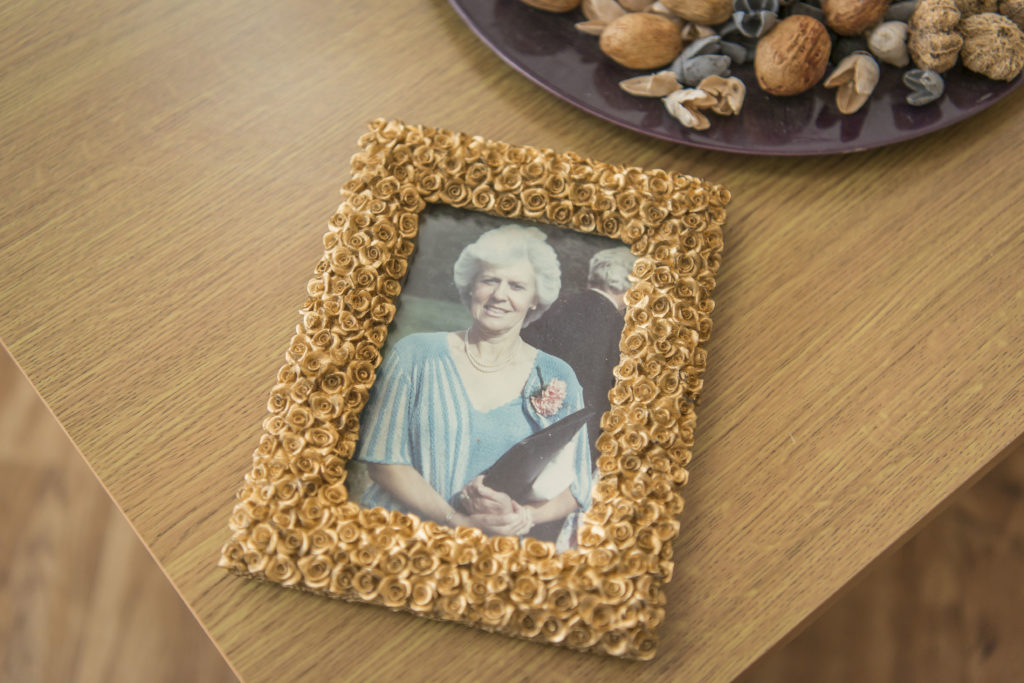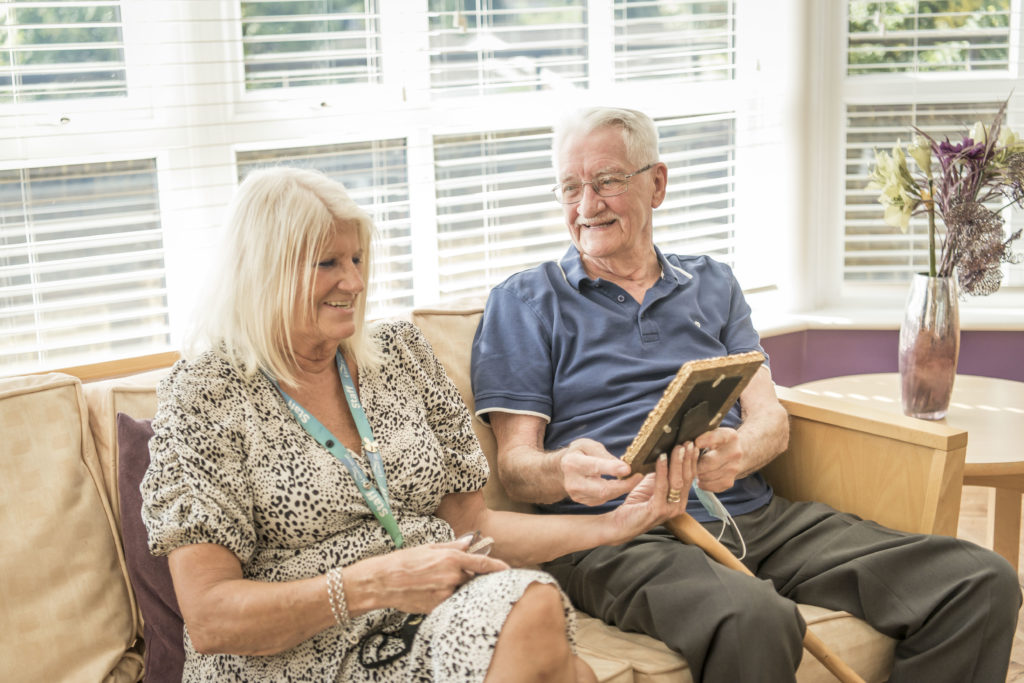News – 7 September 2021
September is World Alzheimer’s Month, highlighting the importance of talking about dementia and how it impacts the daily lives of people affected by the condition.
Mitch, 86, lives in one of our Extra Care schemes and knows all about caring for someone with dementia, since his wife’s diagnosis a while ago. Here’s Mitch and Mary’s story…
Mitch is a resident of Quince Court in Sandy, Beds, and is married to Mary, who has Alzheimer’s. Mary lives in a care home in Meppershall after years of Mitch trying to single-handedly take care of his wife at home in their detached cottage between Arlesey and Stotfold.
Mitch is no stranger to hard work. One of 11 children, he was sent to live in a care home as a child where he received no education and was frequently abused. But when Mitch was called up for National Service, he did his duty and subsequently signed on for regular service.
“I was in the RAF and would fly over RAF Henlow frequently. The weather was always good because it was protected by the surrounding hills. I’d always said that when I retired I wanted to live around here.
“When I left the RAF in 1978 I started working for British Gas. I’d been living in a mobile home in Stondon but was offered a derelict cottage, the old site manager’s office, to ‘do up’. It had no bathroom and the garden was more than overgrown. I lived in just one room for months while I made it habitable.
“I met Mary through our shared love of golf. We had many things in common, not least that we were both widowers, but we also shared a passion for gardening and sunny holidays.
“Mary was born in Edinburgh and was a devoted carer for her older sister, Marion, who had Parkinson’s disease and was registered blind. When we married in 1987 I had no hesitation in accepting Marion into our home too. I said I would look after them both.
“We lived in Bleak House – yes, that really was the name of our home – for more than 40 years. Marion lived with us for 12 years, until she passed away and then we took in Mary’s batchelor brother who had become ill. He died within the year.
“When Mary reached retirement age, her pension was negligible as she’d been an unpaid carer. I was fortunate to have my occupational pension. I was the main wage earner and we’d never claimed any benefits.”
In 2018, life changed for both Mitch and Mary. Mitch became ill, he couldn’t walk and was sent for X-rays. Mitch was told his knees were suffering from wear and tear (not a surprise at the tender age of 83) but was also told he had vascular stenosis and his lower back problems were a result of his years in the military.
“I was struggling to walk so I had to give up golf, and gardening became very limited. I also had to stop driving. Mary’s younger sister, Agnes, became a huge help by becoming our shopper and driver.
“Agnes and her daughter, Kellie, frequently cooked and delivered lunches to us to give me a break, especially during lockdown.
“Then we started to notice that things didn’t seem right with Mary. She’d started to repeat herself and would put money on the shop counter for the check-out person to count out. And if I tried to help Mary in the kitchen, she would get quite possessive about it.
“Then there were her hallucinations; she would see people. I had some sketches framed on the wall, but Mary took them down, saying she’d put them away as ‘they’ were stealing everything, and she would talk to the wall, saying she was calling the police.
“Mary was such a gentle lady, but she’d get so annoyed when we spoke to doctors about her. She was always fastidious, but that deteriorated too.
“She would wander a lot, especially during the night. I was so worried about her. Our cottage was isolated, the stairs were steep. What if she were to fall?
“And then she did fall, twice.
“We would sleep in separate rooms but I’d be awake half the night listening out for her getting out of bed. I was exhausted.
“One day, I was sat in the lounge of our cottage when I saw a police car outside. There was no sign of Mary, where was she?
“Six more police cars arrived and an armed response unit. All road traffic had been stopped.
“I went outside to see what was going on. Police asked me who I was and told me to keep my hands where they could see them.
“I asked where Mary was; she was safe in a police car.
“Mary had flagged down a passing car and told them there was someone inside her home with a gun. They had, of course, called the police.
“The police were very understanding and thankfully no harm was done.
“Agnes and Kellie told me I needed a rest, and I agreed.
“We’d seen the news on TV about Covid-19 in care homes and Mary had made me promise never to put her in one. But sadly I couldn’t keep that promise, and Mary spent two weeks in a care home to give me some respite.
When Mary came home, Mitch was told that she qualified for six hours’ attendance a week, so three times a week, someone would come and sit with Mary for a couple of hours to give Mitch a rest.
“The only problem was, I couldn’t walk, so I couldn’t go out for a drive or go anywhere. It really was no respite and I was still doing the washing, cooking and cleaning.
“I was really struggling. I felt like I’d been abandoned.
“Then a miracle social worker came into our lives – Amena. She was the first person to treat Mary and I as a couple, not just look at helping Mary, but me too. She was so positive.
“I discovered that I was no longer on the housing register with Central Beds Council, I hadn’t been since 2014. Kellie helped me with updating our circumstances to re-join the housing register and bid for suitable accommodation. She was a great help with my subsequent move to Quince Court.
“I’d always saved for a rainy day and now it had started raining.
“Mary was admitted to hospital in May and then moved to the care home in June. She’s safe there.
“Mary’s sister, Agnes, and niece, Kellie, take it in turns to drive me to the home every week so I can visit Mary. Sometimes she presents very well. I don’t know if she really knows me or not.
“I call Mary every night too. I lie to her, but it’s with the best of intentions. I told her the reason she’s in the home is because I’m still waiting for an operation. She always says they should hurry up with my op so we can be together.
“Mary is always indignant, saying she feels fine and there’s nothing wrong with her.
“I know she’s not going to get any better. But I hope and pray that she comes to terms with her life.
“My savings are dwindling, but I’ll sleep in a doorway before I let anything happen to Mary.
“This is the hardest job I’ve had in my life. I was in the RAF for years. Some of the things I’ve seen were nothing compared to how hard it is seeing Mary suffer with dementia.
“I’ve lost the Mary I had; I’ve got a new Mary now.”






